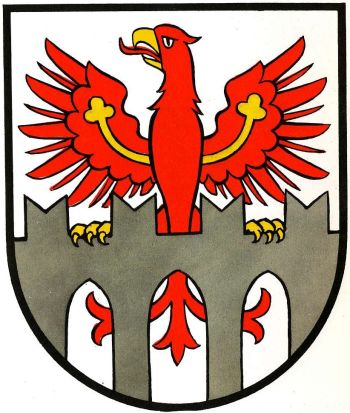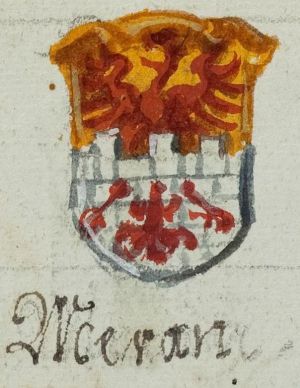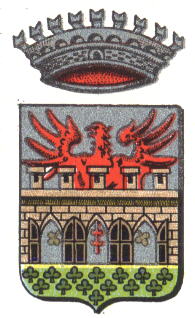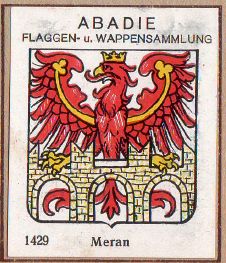Meran: Difference between revisions
Knorrepoes (talk | contribs) m (Text replacement - "====Origin/meaning====" to "===Origin/meaning===") |
Knorrepoes (talk | contribs) m (Text replacement - "Additions :" to "Additions:") |
||
| (9 intermediate revisions by the same user not shown) | |||
| Line 1: | Line 1: | ||
'''MERAN - MERANO''' | '''MERAN - MERANO''' | ||
Region: [[Trentino-Alto Adige]]<br> | Region: [[Trentino-Alto Adige]]<br> | ||
Province : [[Bolzano (province)|Bolzano]]<br> | Province : [[Bolzano (province)|Bolzano]]<br> | ||
Additions : 1923 [[Untermais]] | Additions: 1923 [[Untermais]] | ||
[[File:meran.jpg|center|Stemma di {{PAGENAME}}]] | [[File:meran.jpg|center|Stemma di {{PAGENAME}}]] | ||
= | {| class="wikitable" | ||
|+Official blazon | |||
|- | |||
|'''Italian''' | |||
| | |||
*(de) In Silber ein rechtsschauender, ungekrönter u. golden bewehrter roter Adler mit goldenen Kleeblattspangen, welcher mit den Fängen auf einer durchgehenden Mauer aufsitzt, die mit vier eingespitzten Zinnen bewehrt und durch drei offene Spitzbogentore durchbrochen ist, in welchen die Federn des Adlerschweifes sichtbar sind. | *(de) In Silber ein rechtsschauender, ungekrönter u. golden bewehrter roter Adler mit goldenen Kleeblattspangen, welcher mit den Fängen auf einer durchgehenden Mauer aufsitzt, die mit vier eingespitzten Zinnen bewehrt und durch drei offene Spitzbogentore durchbrochen ist, in welchen die Federn des Adlerschweifes sichtbar sind. | ||
*(it) D'argento all'aquila di rosso priva di corona, rostrata e membrata d'oro, il volo caricato di due spranghette dello stesso, seduto con gli artigli su un muro al naturale toccante i bordi, merlato alla ghibellina di quattro pezzi e aperto di tre archi nei quali si vede la coda. | *(it) D'argento all'aquila di rosso priva di corona, rostrata e membrata d'oro, il volo caricato di due spranghette dello stesso, seduto con gli artigli su un muro al naturale toccante i bordi, merlato alla ghibellina di quattro pezzi e aperto di tre archi nei quali si vede la coda. | ||
|- | |||
|'''English''' | |||
| blazon wanted | |||
|} | |||
===Origin/meaning=== | ===Origin/meaning=== | ||
| Line 18: | Line 25: | ||
{|align="center" | {|align="center" | ||
|align="center"|[[File:{{PAGENAME}}16.jpg|center|300 px|Coat of arms (crest) of {{PAGENAME}}]] <br/>The arms in a [[:Category:Windhag city arms|16th century manuscript]] | |||
|align="center"|[[File:merano.jpg|center|Stemma di {{PAGENAME}}]] <br/>The arms in Stemmi delle principali città d'Italia. Milano (pre 1940) | |align="center"|[[File:merano.jpg|center|Stemma di {{PAGENAME}}]] <br/>The arms in Stemmi delle principali città d'Italia. Milano (pre 1940) | ||
|- | |||
|align="center"|[[File:1429.aba.jpg|center|Arms (crest) of {{PAGENAME}}]] <br/>The arms in the [[Abadie]] albums | |||
|} | |} | ||
Latest revision as of 10:46, 28 January 2024
MERAN - MERANO
Region: Trentino-Alto Adige
Province : Bolzano
Additions: 1923 Untermais
| Italian |
|
| English | blazon wanted |
Origin/meaning
The arms are known since the 14th century. Merano was known in the Roman times and was granted city rights between 1270 and 1317. The oldest known seal with the arms dates from 1353. In colour the arms appear in a roll of arms from 1390.
The arms basically show the eagle of Tyrolia behind a city wall. The oldest seal shows the wall with four towers and three gates as in the present arms, the roll of arms does not show gates. In a picture from 1759 the eagle is crowned and has a green wreath of honour. Finally during the fascist era the city was granted new arms in 1928, showing the eagle behind a wall with five towers. The whole was placed on a bottom of green, dotted with green trefoils. Above the shield a mural crown was placed (see below). These arms were replaced by the historical arms after the war.
| The arms in a 16th century manuscript |
The arms in Stemmi delle principali città d'Italia. Milano (pre 1940) |
| The arms in the Abadie albums |
Contact and Support
Partners:
Your logo here ?
Contact us
© since 1995, Heraldry of the World, Ralf Hartemink 
Index of the site
Literature : Prünster, 1972; Gall, F. : Österreichischer Wappenkalender, 1960.













